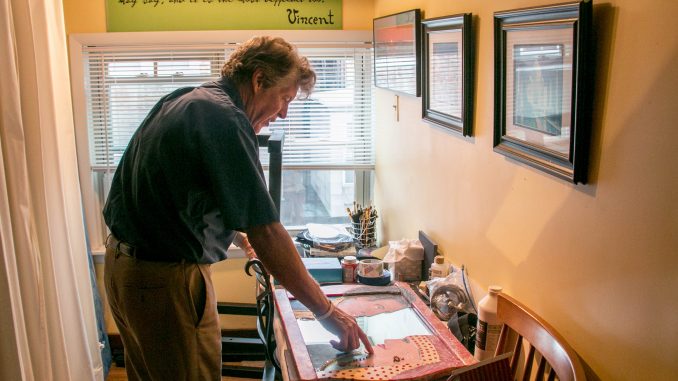
Sometimes, when John Creveling is working on a new piece, he forgets to take his medication.
“That’s the wonderful thing about that, you’re so involved, you’re so engaged, immersed in creating, that you forget you have anything, any disease,” Creveling said.
Creveling, a 2003 alumnus who earned his master’s in education at Temple, has Parkinson’s disease, but doesn’t want his condition to “be the conversation.”
In fact, after being officially diagnosed in 2009 with the chronic and progressive movement disorder, often characterized by tremors, stiffness in the limbs and decline of nerve cells in the brain, Creveling really didn’t want to talk about it at all.
“I didn’t think it was unusual that most people want to hide whatever it is they have,” Creveling said. “I didn’t want to be ‘that guy with PD,’ because I wanted people to know me for John, for who I am, not the disease I have.”
But then Creveling met a woman while traveling and discovered her brother had Parkinson’s as well. After having a “little cry together,” he realized talking about the disease could be powerful.
“If I’m not talking about it, how can I be an advocate for research?” Creveling said. “If you want to find the cure for a disease, you need to have the conversation going. I realized then I wanted to be more of a vocal advocate for looking for the cure.”
Now, Creveling, a retired career and leadership coach, is expressing himself a bit more boldly—his photograph will be the cover of the Parkinson’s Disease Foundation’s Parkinson’s and Creativity 2016 calendar.
“The calendar really helps raise awareness, which is a valuable thing,” said Melissa Barry, the director of communications at the Parkinson’s Disease Foundation.
The calendar started with one exhibit of artwork created by people with the disease, Barry said, as part of the foundation’s contribution to the World Parkinson’s Conference in 2006.
“At the time, we had several people come to us and say there’s a relationship between creativity and Parkinson’s,” Barry said. “A lot of people would say they were not artistic before—not always, though—but for some reason, after diagnosis, they find it therapeutic.”
Though Creveling is not defined by his disease, the diagnosis certainly changed his outlook—he “discovered art” for the first time. Though his wife Christina Creveling said her husband has “always been creative,” she recognized his turn towards artistic mediums as “a wonderful reaction to a life challenge.”
Now, John Creveling draws, paints and photographs. His work isn’t limited to the canvas—inside his home, the bathroom wall is overtaken by a mural of Center City’s skyline, complete with William Penn’s silhouette on City Hall and hidden messages that glow in the dark.
“I feel this urgency, this desire, this want to be creative in as many ways as I can,” John Creveling said.
“You can also get so caught up in the moment when you’re creating and PD goes on the backburner,” Christina Creveling added.
John Creveling doesn’t think he’s the only one experiencing this freedom through art.
“Parkinson’s Foundation has enabled people with Parkinson’s to express themselves creatively, and there are more than 400 people with PD that have presented their work to PDF to display,” he said. “That has provided opportunities for people to see their art that might not see it otherwise.”
But it’s not just about fundraising calendars and online galleries.
“[We are] more than what you see,” John Creveling said. “Because there’s people that have PD that are so incredibly talented in a variety of fashions that you might not know unless there was an opportunity.”
The mission, at the end of the day, is funding research for Parkinson’s. Creveling’s undergone research advocacy training, Barry said, and is “incredibly committed to fighting Parkinson’s in a number of ways.”
John Creveling’s motto is “have PD, will travel.” For him, that means he’s looking for a cure—that he will travel “anyplace in the world” if he can contribute to curing the disease.
“I’m on a quest,” John Creveling said. “It’s time to find a cure.”
Victoria Mier can be reached at victoria.mier@temple.edu.


Be the first to comment